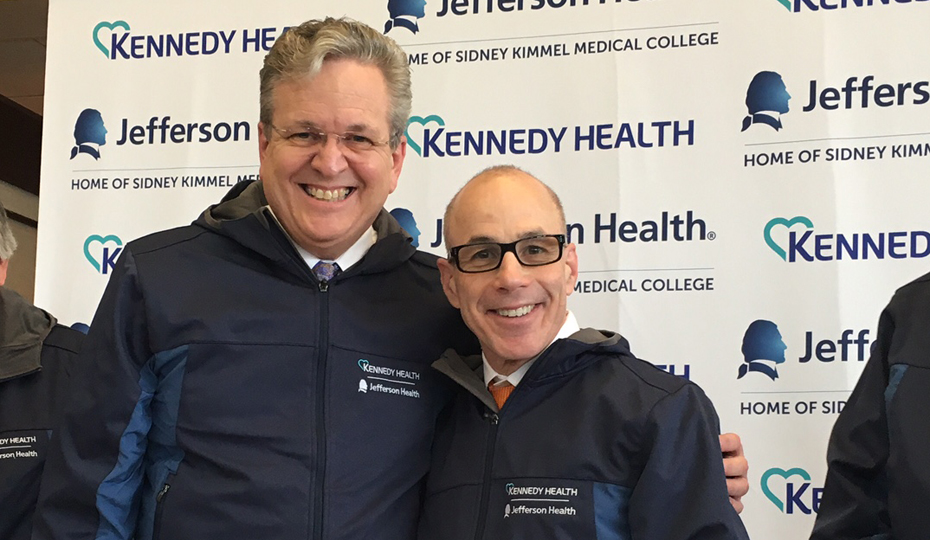Why Jefferson is in Merger Mania

Joseph Devine (left) with Dr. Stephen Klasko announcing the merger between Jefferson and Kennedy Health on Friday.
Dr. Stephen Klasko knows that in today’s ever-changing health care landscape, bigger is better. Bigger means easier negotiations with insurance companies. Bigger means more capital to invest in new technology. Bigger means reducing costs through consolidation.
In case you missed it amid the pre-blizzard hysteria, Jefferson announced a merger with Kennedy Health on Friday — making one of the biggest health care systems in the region even bigger. The combined organization will generate nearly $4 billion in revenues each year. It’s Jefferson’s fourth merger in the past year after previously announced deals with Abington Health, Aria Health and Philadelphia University.
But “bigger” has a different meaning at Jefferson. Rather than building or expanding facilities in Center City, Klasko and the Jefferson team have been reaching outward to bring care to the patients. The Abington deal brought Jefferson to Montgomery County. The Aria deal gives them a solid presence in Northeast Philly and parts of Bucks County. The new Kennedy Health merger would add three hospitals in South Jersey as well as $540 million in revenue and more than 900 physicians.
(We honestly don’t know what to make of the Philly U. deal. More creative people becoming doctors? Jefferson students able to get more of a traditional college experience by joining clubs and playing sports? Stay tuned.)
It’s all part of Klasko’s plan to create a “Netflix model” of bringing care to patients, rather than a “Blockbuster model” where patients travel for care.
“Academic medical centers always acted like Blockbuster, ‘we’re going to partner with you so you can send [people] down to our very expensive, and in some cases inefficient places …’ ” Klasko said, careful not to name Penn, Temple or others by name. “Netflix recognized that it wasn’t about the stores, it was about the entertainment. We recognize that it’s not about our hospitals, it’s about the care and caring that we give.”
Klasko also has a strong vision that all this growth will lead to big gains in innovation — especially in South Jersey. “This is about turning this community into a mecca for entrepreneurial academic healthcare,” he said.
So will it be called Jefferson? Kennedy Health? Something else? No decisions have been made just yet, said Kennedy President and CEO Joseph Devine.
“The Jefferson brand means a lot to us,” said Devine. “The Jefferson brand is part of what this initiative is about. It’s a very strong brand, has a strong reputation and we think that’s an important component going forward. But we have a respected name that’s grown.”
Whatever it’s named, Klasko said the combined organization will lead to doctors who are trained to be more in-tuned with patients.
“We still select docs based on [organization] size, GPAs, MCATs and organic chemistry grades,” he said, “and somehow we’re amazed that doctors aren’t more empathetic, communicative and creative.”
Another reason Jefferson thinks it’s so important to grow is technical advancements in medicine.
“The disruption and transformation in health care is going to be huge …,” he said. “There’s a 100 percent chance that five years from now, we’re going to have to prove our technical competence to people who want to partner [with us].”
What’s in it for Kennedy?
Kennedy — like virtually everyone else in the health care space — has been examining mergers and partnerships for quite some time. Devine said the organization had plenty of potential partners, but chose Jefferson — which offered equal representation on its growing board of directors.
“Sometimes you have to seize the opportunity,” said Devine. “As I told our medical staff, we do not have to do this. We do not. We can continue moving forward and doing the things we’re doing today. But if you start really thinking about the future and where health care is going, we have to become part of something greater that will continue to drive the future of innovation.”
There won’t be any layoffs at Kennedy due to the merger. In fact, Devine anticipates job growth. Klasko took it a step further: “At Jefferson, we’re proud that with all these changes, we haven’t laid off anybody.”
Combining the organizations makes it easier for Kennedy to innovate and better utilize technology, Devine said.
“Today’s generation wants things differently than my parents or my generation. What Steve is doing on innovation, we want to be tied into because the people in these communities need to have that access to it,” said Devine. “To recreate that in each organization just drives up costs. This is a way to become creative together.”
More Mergers to Come?
Jefferson is already much bigger than it was just a year ago. But Klasko and Devine both said they’re open to making it even larger or adding non-merger partnerships.
“Size is not ultimately the issue,” said Devine. “But what are the resources you have available in your system that actually can make your system better for the future?”
Klasko said: “I think what we’ll do is get together with our partners and say who else wants to get involved.”
Like what you’re reading? Stay in touch with BizPhilly — here’s how:
- Follow BizPhilly on Twitter and follow editor Jared Shelly here.
- Get the BizPhilly Newsletter
- Like BizPhilly on Facebook
- Check out the BizPhilly homepage


